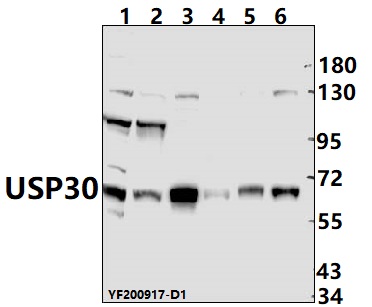Product Name :
USP30 polyclonal antibody Background :
The ubiquitin (Ub) pathway involves three sequential enzymatic steps that facilitate the conjugation of Ub and Ub-like molecules to specific protein substrates. Through the use of a wide range of enzymes that can add or remove ubiquitin, the Ub pathway controls many intracellular processes such as signal transduction, transcriptional activation and cell cycle progression. USP30 (ubiquitin specific peptidase 30) is a 517 amino acid protein that localizes to the mitochondrion and belongs to the ubiquitin-specific protease family. Expressed in pancreas, kidney, liver and skeletal muscle, USP30 functions to catalyze the conversion of a ubiquitin C-terminal thioester to a free ubiquitin and a thiol. The gene encoding USP30 maps to human chromosome 12q24.11, which encodes over 1,100 genes and comprises approximately 4.5% of the human genome. Product :
Rabbit IgG, 1mg/ml in PBS with 0.02% sodium azide, 50% glycerol, pH7.2. Storage&Stability :
Store at 4°C short term. Aliquot and store at -20°C long term. Avoid freeze-thaw cycles. Specificity :
USP30 polyclonal antibody detects endogenous levels of USP30 protein. Immunogen :
Synthetic peptide, corresponding to Human USP30. Conjugate :
Unconjugated Modification :
Unmodification
USP30 polyclonal antibody Background :
The ubiquitin (Ub) pathway involves three sequential enzymatic steps that facilitate the conjugation of Ub and Ub-like molecules to specific protein substrates. Through the use of a wide range of enzymes that can add or remove ubiquitin, the Ub pathway controls many intracellular processes such as signal transduction, transcriptional activation and cell cycle progression. USP30 (ubiquitin specific peptidase 30) is a 517 amino acid protein that localizes to the mitochondrion and belongs to the ubiquitin-specific protease family. Expressed in pancreas, kidney, liver and skeletal muscle, USP30 functions to catalyze the conversion of a ubiquitin C-terminal thioester to a free ubiquitin and a thiol. The gene encoding USP30 maps to human chromosome 12q24.11, which encodes over 1,100 genes and comprises approximately 4.5% of the human genome. Product :
Rabbit IgG, 1mg/ml in PBS with 0.02% sodium azide, 50% glycerol, pH7.2. Storage&Stability :
Store at 4°C short term. Aliquot and store at -20°C long term. Avoid freeze-thaw cycles. Specificity :
USP30 polyclonal antibody detects endogenous levels of USP30 protein. Immunogen :
Synthetic peptide, corresponding to Human USP30. Conjugate :
Unconjugated Modification :
Unmodification
-
 Western blot (WB) analysis of USP30 polyclonal antibody at 1:500 dilution Lane1:Aml-12 whole cell lysate(40ug) Lane2:H9C2 whole cell lysate(40ug) Lane3:HEK293T whole cell lysate(20ug) Lane4:The muscle tissue lysate of mouse(40ug) Lane5:Panc1 whole cell lysate(20ug) Lane6:HepG2 whole cell lysate(20ug)
Western blot (WB) analysis of USP30 polyclonal antibody at 1:500 dilution Lane1:Aml-12 whole cell lysate(40ug) Lane2:H9C2 whole cell lysate(40ug) Lane3:HEK293T whole cell lysate(20ug) Lane4:The muscle tissue lysate of mouse(40ug) Lane5:Panc1 whole cell lysate(20ug) Lane6:HepG2 whole cell lysate(20ug)
Bioworld Biotech only provide peptides for our antibodies and do not provide additional peptide customization services.
Price/Size :
USD 368/1mg/vial
Tips:
For phospho antibody, we provide phospho peptide(0.5mg) and non-phospho peptide(0.5mg).Describe :
Blocking peptides are peptides that bind specifically to the target antibody and block antibody binding. These peptide usually contains the epitope recognized by the antibody. Antibodies bound to the blocking peptide no longer bind to the epitope on the target protein. This mechanism is useful when non-specific binding is an issue, for example, in Western blotting (WB) and Immunohistochemistry (IHC). By comparing the staining from the blocked antibody versus the antibody alone, one can see which staining is specific; Specific binding will be absent from the western blot or IHC performed with the neutralized antibody.Formula:
Synthetic peptide was lyophilized with 100% acetonitrile and is supplied as a powder. Reconstitute with 0.1 ml DI water for a final concentration of 10 mg/ml.The purity is >90%,tested by HPLC and MS.
Storage:
The freeze-dried powder is more stable. For short time at 2-8°C. For long term storage store at -20°C.
Note :
This product is for research use only (RUO only). Not for use in diagnostic or therapeutic procedures.
 USP30 polyclonal antibody
USP30 polyclonal antibody  Datasheet
Datasheet COA
COA MSDS
MSDS SHIP
SHIP